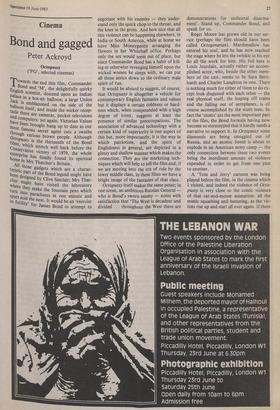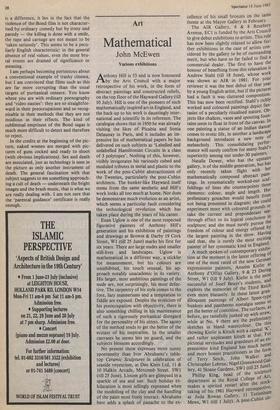Cinema
Bond and gagged
Peter Ackroyd
Octopussy (PG', selected cinemas)
Towards the end this film, Commander Bond and 'IA', the delightfully quirky English scientist, descend upon an Indian Palace in a hot-air balloon; a large Union Jack is emblazoned on the side of the balloon itself, and inside the wicker recep- tacle there are cameras, pocket televisions and computers: yet again, Victorian Values have been brought bang up to date as our most famous secret agent cuts a swathe through various brown people. Although Octopussy is the thirteenth of the Bond films, which stretch well back before the Conservative victory of 1979, the whole enterprise has finally found its spiritual home in Mrs Thatcher's Britain.
All those gadgets which are a charac- teristic part of the Bond legend might have beenher designed by Clive Sinclair; Mrs That- might have visited the laboratory where they make the fountain pens which into nto parachutes at one minute and spurt acid the next. It would be an 'exercise in futility' for James Bond to attempt to negotiate with his enemies — they under- stand only the quick chop to the throat, and the knee in the groin. And how nice that all this violence can be happening elsewhere, in India or South America, while at home we have Miss Moneypenny arranging the flowers in her Whitehall office. Perhaps only the sex would seem out of place, but since Commander Bond has a habit of kill- ing or otherwise 'revenging himself upon the wicked women he sleeps with, we can put all those antics down to the ordinary male spirit of fun.
It would be absurd to suggest, of course, that Octopussy is altogether a vehicle for contemporary English fantasies and values but it displays a certain coldness or hard- ness which, when compounded with a high degree of irony, suggests at least the presence of similar preoccupations. The association of advanced technology with a certain kind of superiority is one aspect of this but, more importantly, it is the way in which patriotism, and the spirit of Englishness in general, are depicted in a glossy and shallow manner which makes the connection. They are the marketing tech- niques which will help to sell the film and, if we are moving into the era of rule by the lower middle class, in these films we have a bright image of the fantasies of that class.
Octopussy itself makes the same point; in one scene, an ambitious Russian General who is Bond's sworn enemy — notes with satisfaction that 'The West is decadent and divided ... throughout the West there are
demonstrations for unilateral disarma- ment'. Stand up, Commander Bond, and speak for us.
Roger Moore has grown old in our ser- vice (perhaps the film should have been called Octogenarian). Marshmallow has entered his soul, and he has now reached the stage where he lets the twinkle in his eye do all the work for him. His foil here is Louis Jourdain, actually rather an accom- plished actor, who, beside the other mem- bers of the cast, seems to be Sara Bern- hardt and Charles Laughton in one. There is nothing much for either of them to do ex- cept look disgusted with each other — the real physical stuff, the leaping off trains and the falling out of aeroplanes, is of course accomplished by the stunt men. In fact the 'stunts' are the most important part of the film, the Bond formula having now become so stereotyped that it hardly needs a narrative to support it. In Octopussy some diamonds are being smuggled out of Russia, and an atomic bomb is about to explode in an American army camp — the only connection between these two events being the inordinate amount of violence expended in order to get from one plot to another.
A 'Tom and Jerry' cartoon was being played before the film, in the cinema which I visited, and indeed the violence of Octo- pussy is very close to the comic violence of that cat-and-mouse animation: all the manic squashing and battering, as the vic- tims rise up and start all over again. If there
is a difference, it lies in the fact that the violencei of :the Bond film is not character- ised] byj ordinary comedy but by irony and parody — the killing is done with a smile, the rape and carnage are not meant to be `taken seriously'. This seems to be a pecu- liarly English characteristic: in the general absence of real values, even the most bru- tal events are drained of significance or meaning.
I am perhaps becoming portentous about a conventional example of trashy cinema, but I am convinced that films such as this are far more corrupting than the usual targets of puritanical censure. You know where you are with ordinary pornography and 'video nasties': they are so straightfor- ward in their preoccupations and so recog- nisable in their methods that they are not insidious in their effects. The kind of subliminal emptiness of the Bond sagas is much more difficult to detect and therefore to reject.
In the credits at the beginning of the pic- ture, naked women are merged with pic- tures of guns cocked and ready to shoot (with obvious implications). Sex and death are associated, just as technology is seen in the picture as only another instrument of death. The general fascination with that subject suggests to me something approach- ing a cult of death — underneath the bright images and the brash music, that is what we are really dealing with. I am not sure that the 'parental guidance' certificate is really enough.







































 Previous page
Previous page